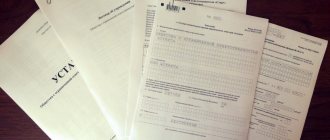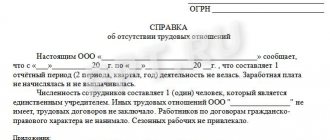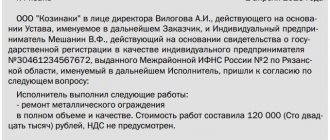Tax officials have the right to request documents necessary for verification from the company itself (clause 1 of Article 93 of the Tax Code of the Russian Federation) or from its counterparties (clause 1 of Article 93.1 of the Tax Code of the Russian Federation). Failure to provide them may result in a fine of 200 rubles. for each document (Article 126 of the Tax Code of the Russian Federation). However, the Tax Code does not establish which documents are relevant to the audit. Both courts and tax authorities recognize this concept as evaluative. Inspectors insist that it is their responsibility to determine whether a particular document is necessary for inspection.
In what situations does the Tax Code allow inspectors to request documents?
The Tax Code of the Russian Federation specifies cases when the inspection has the right to request certain documents as part of a desk audit.
1. The taxpayer has operations (property) for which he applied a tax benefit. Documents that confirm the right to the benefit declared in the declaration.
2. The taxpayer submits a VAT return with the amount of tax to be refunded. Documents that confirm the legality of the taxpayer’s deductions under Art. 172 Tax Code of the Russian Federation
3. The taxpayer is a party to the investment partnership agreement and has submitted a declaration (calculation) for income tax or personal income tax.
Information that reflects:
— the period of participation of the taxpayer in the investment partnership agreement;
- his share of the profits (expenses, losses) of the investment partnership
4. The taxpayer submitted an updated declaration in which the amount of tax payable is less or the amount of loss is greater than in the previously submitted reports for the same period. In this case, the “clarification” was submitted two years after the date established for filing primary reports for the corresponding reporting (tax) period
The documents listed in clause 8.3 of Art. 88 of the Tax Code of the Russian Federation, namely:
— primary and other documents confirming changes in information in the relevant reporting indicators;
— analytical tax accounting registers, on the basis of which the indicated indicators are formed before and after their changes.
5. Taxes related to the use of natural resources are being audited.
Documents on the basis of which the tax was calculated and paid.
6. Information on transactions reflected in the VAT return submitted by the taxpayer contradicts each other or does not correspond to data on the same transactions contained in:
- in a VAT return submitted by another taxpayer, another person obliged to file a VAT return;
- in the log of received and issued invoices submitted to the tax authority by the person
Invoices, primary and other documents related to these transactions. Other documents include, for example, a sales book, a purchase book, a log of received and issued invoices.
7. A taxpayer using tax benefits provided for participants in regional investment projects by the Tax Code of the Russian Federation and the laws of the constituent entities of the Russian Federation has submitted a declaration to the tax authority stating such a benefit.
Documents and information that confirm the compliance of the implementation indicators of a regional investment project with the requirements for such projects and their participants established by the Tax Code of the Russian Federation and the laws of the relevant constituent entities of the Russian Federation.
8. The taxpayer submits an excise tax return if any of the following conditions are met:
— the declaration states tax deductions under Art. 200 of the Tax Code of the Russian Federation due to the fact that the buyer returned to the taxpayer previously sold excisable goods, except for alcohol and excisable alcohol-containing products;
- the declaration was submitted due to the fact that the taxpayer, a manufacturer of alcoholic and excisable alcohol-containing products, returned ethyl alcohol to the supplier - the manufacturer of ethyl alcohol;
— the declaration reflects tax deductions for the amounts of excise duty that the taxpayer paid when importing excisable goods into the Russian Federation, which were subsequently used as raw materials for the production of excisable goods.
Primary and other documents confirming the return of excisable goods and the legality of applying deductions of excise tax amounts. The exception is documents previously submitted to the tax authorities for other reasons.
9. A desk audit of the calculation of insurance premiums is carried out, which reflects the amounts not subject to insurance premiums, and reduced insurance premium rates are applied.
Information and documents confirming the validity of reflecting amounts not subject to insurance premiums and the application of reduced insurance premium rates.
10. A desk audit of the income tax return is carried out, in which the investment tax deduction provided for in Art. 286.1 Tax Code of the Russian Federation.
Explanations regarding the application of the investment tax deduction, and primary and other documents confirming the legality of its application.
Analytical accounting documents requested
When conducting an audit, tax authorities often require analytical accounting documents from an organization: its general ledger, balance sheets, account statements and other analytical accounting documents that are not primary. However, even the Federal Tax Service confirms that such a requirement is unlawful (letter dated September 13, 2012 No. AS-4-2 / [email protected] ).
The courts agree with this, emphasizing that analytical accounting documents do not contain the information necessary for calculating taxes and fees. Decisions in favor of companies are contained in decisions of the Federal Antimonopoly Service of the North-West dated 04/18/13 No. A56-26755/2012, West Siberian of 03/26/13 No. A03-7357/2012, Moscow dated 03/01/13 No. A40-12594/12-90- 60, Far Eastern district No. F03-5163/2011 dated October 26, 2011, North Caucasian district No. A53-23465/2010 dated October 7, 2011.
Documents within the framework of a desk audit on VAT that inspectors have the right and not the right to require
What tax authorities are not entitled to
The tax authority does not have the right to expand the range of required documents, which is outlined in the relevant provision of the Tax Code of the Russian Federation.
Regional and local authorities also do not have the right to expand the range of documents submitted for desk audit by adopting regulatory legal acts.
The tax authority has the right to require only those documents that directly relate to the subject of the audit. If the taxpayer has not fulfilled the requirement, which requested additional documents not related to the audit issues, he cannot be fined under clause 1 of Art. 126 of the Tax Code of the Russian Federation (Resolution of the Presidium of the Supreme Arbitration Court of the Russian Federation dated 04/08/2008 N 15333/07).
The taxpayer cannot be held liable for failure to submit documents under paragraph 1 of Art. 126 of the Tax Code of the Russian Federation, if they are not directly related to the calculation of the tax being audited.
As a general rule, it is prohibited to repeatedly request documents during a desk audit that the taxpayer has previously submitted to the inspectorate during desk or field tax audits, as well as documents submitted by him in the form of certified copies during tax monitoring.
Tax authorities often formulate their requirement for the presentation of documents in such a way that it is impossible to understand from it exactly what documents must be presented, but one can draw a conclusion about the range of documents required.
For example, the requirement states: “Submit documents confirming the right to apply the corporate property tax benefit in the third quarter of 2021.”In practice, it is more profitable to contact the inspector to clarify the requirement, so that he would specify which documents he is interested in. However, you should not seek clarification if you do not want to submit documents and are ready to defend your position in court. In this case, your appeal will simply give the tax authorities a reason to clarify the requirement.
Request by the tax inspectorate for documents for verification
Do tax officials require documents for verification? This is probably not the most pleasant event in the life of any taxpayer (and the accounting department is completely shocked), since fulfilling such a requirement is always associated with a lot of hassle: firstly, to meet the deadline and submit all the documents requested by the inspectors; secondly, to make a huge number of their copies, as a rule.
And the most important thing is to avoid the punishment provided for in paragraph 1 of Art. 126 of the Tax Code of the Russian Federation, since tax inspectors can hold the taxpayer liable under this norm, sometimes without justification, as evidenced by extensive judicial practice.
We will tell you in the article how to take into account the experience (sometimes negative) of other taxpayers and thereby avoid “sharp edges” in presenting requested documents to tax authorities, as well as analyze the existing judicial practice. Legislative norms Tax legislation provides for the right of officials of the tax authority conducting a tax audit to request the necessary information and documents. This norm is enshrined in Art. 93 and 93.1 of the Tax Code of the Russian Federation ; their effect extends to desk and on-site inspections. Let us note that Art. 93.1 of the Tax Code of the Russian Federation is special in relation to Art. 93 of the Tax Code of the Russian Federation, since the direct procedure for submitting documents (information) about the taxpayer, payer of fees and tax agent or information about specific transactions is carried out according to the general rules established by Art. 93 of the Tax Code of the Russian Federation , concerning the request for documents during tax audits. Request for documents is provided for as additional tax control measures in paragraph 6 of Art. 101 Tax Code of the Russian Federation . According to this norm, if it is necessary to obtain additional confirmation of violations of the legislation on taxes and fees or the absence thereof, the head (deputy head) of the tax authority has the right to make a decision to carry out additional tax control measures within a period not exceeding one month. What documents are we talking about in this case, since the very concept of “documents” is quite general? We will find the answer to this question in paragraphs. 6 clause 1 art. 23 of the Tax Code of the Russian Federation , according to which taxpayers are required to submit to the tax authorities and their officials the documents necessary for the calculation and payment of taxes, in cases and in the manner provided for by the Tax Code of the Russian Federation . However, the Ministry of Finance went further and in Letter dated December 4, 2007 No. 03 02 07/1-468, explained: tax authorities, in order to control the correctness of calculation, completeness and timeliness of payment of taxes to the budget system of the Russian Federation, have the right to request tax and accounting data from the taxpayer, and as well as accounting and tax reporting. In addition, bringing to justice for a tax offense specified in paragraph 1 of Art. 126 of the Tax Code of the Russian Federation , applies if the taxpayer did not submit documents required by the legislation on taxes and fees within the prescribed period, or refused to comply with the requirement of the tax authority ( clause 4 of Article 93 of the Tax Code of the Russian Federation ). The said norm does not provide for any other documents. At the same time, there are two documents that meet the criteria listed above, for failure to submit which the taxpayer will not be held liable as specified in paragraph 1 of Art. 126 Tax Code of the Russian Federation . They are named in the information letters of the Presidium of the Supreme Arbitration Court: – appendices to tax returns ( clause 20 of Letter No. 71 dated March 17, 2003 ); – declaration of insurance contributions for compulsory pension insurance ( clause 8 of Letter No. 106 dated March 14, 2006 ) (relevant if the period under review is before January 1, 2010). In paragraph 2 of Art. 93 of the Tax Code of the Russian Federation states that the requested documents are presented in the form of copies (it is not prohibited to submit original documents, but we will talk about what consequences this can lead to later), which must be certified by the signature of the head (deputy head) and (or) other of an authorized person and the seal of the organization, unless otherwise provided by the legislation of the Russian Federation. Tax officials have the right, if necessary, to familiarize themselves with the original documents. In the case of an on-site audit, tax authorities can do this only on the territory of the taxpayer ( Clause 12, Article 89 of the Tax Code of the Russian Federation ). The requirements for the preparation of copies are described in letters of the Federal Tax Service of Russia dated 02.08.2005 No. 01 2 04/1087 and the Ministry of Finance of Russia dated 01.02.2010 No. 03 02 07/1-35. And in Letter No. 03 02 07/1-327 dated July 12, 2007, the financiers indicated that the Tax Code of the Russian Federation does not provide for the obligation of tax authorities to return copies of documents submitted to them. In addition, the tax authority has the right to seize the original documents of the person being inspected in the manner regulated by Art. 94 Tax Code of the Russian Federation . This happens if there are not enough copies of documents to carry out tax control activities and the tax authorities have sufficient grounds to believe that the original documents can be destroyed, hidden, corrected or replaced (clause 8 of Article 94 of the Tax Code of the Russian Federation). When such documents are confiscated, copies are made of them, which are certified by a tax official and handed over to the person from whom they are confiscated. If it is impossible to make or transfer the copies made simultaneously with the seizure of the documents, the tax authority transfers them to the person from whom the documents were seized within five days after the seizure. However, some difficulties may arise with the return of original documents, since neither the Tax Code nor other legal acts contain rules governing the procedure for returning original documents seized during the seizure. From a systematic analysis of the norms of tax legislation, it follows that at the end of the tax audit, the documents seized from the taxpayer (in the original) by the tax authority must be returned (see Resolution of the Federal Antimonopoly Service of the North-West Zone dated August 22, 2008 No. A56-1383/2008 ). Financiers in Letter dated December 21, 2004 No. 03 02 07/90 pointed out the absence of established deadlines for the return of original documents, emphasizing that tax authorities, when carrying out on-site tax audits, are bound by the deadlines determined by the Tax Code of the Russian Federation for conducting them, considering materials and making decisions based on their results. With regard to the return of original documents, more clear provisions are contained in paragraph 14 of the Instruction “On the procedure for the seizure by an official of the state tax inspectorate of documents indicating concealment (understatement) of profit (income) or concealment of other objects from taxation from enterprises, institutions, organizations and citizens " : they (such documents) are stored in the special department of the tax inspectorate until the head of the tax inspectorate makes a decision on their inspection, verification and research. In the absence of abuse, the seized documents are returned to taxpayers, otherwise the documents may be transferred to the investigative authorities and they will make the decision on their return. Resolution of the Federal Antimonopoly Service No. A52-6074/2009 dated April 12, 2010 recognized as legal the decision of the Federal Tax Service to refuse to return to OJSC the original documents seized during an on-site tax audit. The court pointed out that the inspectorate did not have the actual ability to return documents, since, based on the results of the inspection, the company appealed the tax authorities’ decision in court; The tax authorities, in turn, used the original documents as evidence, adding them to the case materials. In another case, the judges came to the conclusion that the inspection’s production of copies of documents for the company and the transfer of original documents to the internal affairs body complied with the law (see Resolution of the Federal Antimonopoly Service UO dated July 12, 2008 No. F09-9872/07-S3 ). Clause 3 of Art. 93 of the Tax Code of the Russian Federation establishes a 10-day period during which the taxpayer must fulfill the obligation to submit documents. In this case, the period is not defined in calendar days, therefore, it is calculated in working days ( Clause 6, Article 6.1 of the Tax Code of the Russian Federation ), that is, weekends and holidays are not taken into account. Since the specified period is calculated from the moment the demand is received, it is necessary to indicate the date of its delivery. In the event that the person being inspected is unable to meet the 10-day deadline, the specified norm prescribes a procedure for extending the said period. Type and content of the request When requesting documents, the tax authorities must serve the taxpayer being inspected (his representative) with a request to submit documents. It is drawn up in the form provided for in Appendix 5 to the Order of the Federal Tax Service of Russia dated May 31, 2007 No. MM-3-06 / [email protected] Note that such a requirement has the right to sign any official of the tax authority (or more precisely, any employee of the tax authority acting within its competence), making a decision on the submission of documents by the taxpayer, since the said form does not provide for such mandatory details as the signature of the head (deputy head) of the tax authority and seal (a similar conclusion was made by financiers in Letter dated March 22, 2010 No. 03 02 07/1 -122 ). From the Decree of the Constitutional Court of the Russian Federation dated December 4, 2003 No. 418 -O, it follows that the absence of a signature on the request of the immediate head of the tax authority does not change the legal nature of the act as non-regulatory and does not relieve the taxpayer from performing certain duties. However, the form of the request for the submission of documents contains an instruction to indicate the names, details and other individualizing characteristics of the required documents, as well as the period to which they relate. Officials of the Ministry of Finance also draw attention to this in letters dated July 26, 2007 No. 03 02 07/1-348, dated June 25, 2007 No. 03 02 07/2-106 , it is these signs that become the cause of disagreements between the tax inspectorate and the taxpayer. A similar opinion was expressed in the Resolution of the Federal Antimonopoly Service of the Moscow Region dated January 13, 2010 No. KA-A41/14901-09. Thus, the requirement to submit documents must be made in writing; in the event of an oral request from the tax authorities, the taxpayer has the right not to comply without any undesirable consequences for himself. Methods of serving a demand As a rule, tax authorities serve a demand against the taxpayer’s signature, but due to the absence of Art. 93 of the Tax Code of the Russian Federation any unambiguous instructions on the method (method) of serving this demand, they can use other options. If a demand is served against a receipt, the question arises: who should receive such a demand and sign for receipt? Since in this case we are talking about tax legal relations, according to Art. 27 and 29 of the Tax Code of the Russian Federation, the taxpayer can participate in them either personally or through a legal (or authorized) representative. In other words, the demand will be served properly if the head of the organization or his legal representative signs for its receipt on the basis of a power of attorney. We draw your attention to the fact that if a request is received by unauthorized persons, tax authorities cannot hold the taxpayer liable under paragraph 1 of Art. 126 of the Tax Code of the Russian Federation , and an official of the organization - under Part 1 of Art. 15.6 Code of Administrative Offenses of the Russian Federation . Also Art. 93 of the Tax Code of the Russian Federation does not contain any restrictions regarding sending a claim by mail. In this case, the day of its delivery is the date of actual receipt of the letter.
Please note: The rule according to which a document sent by tax authorities by mail is considered received six days from the date the letter was sent, is valid only in cases specifically specified by the Tax Code of the Russian Federation (see, for example, paragraph 3, paragraph 3, Article 46, paragraph 5, Art. 68, paragraph 2, paragraph 6, article 69, paragraph 2, paragraph 5, article 100 of the Tax Code of the Russian Federation ). But Article 93 of the Tax Code of the Russian Federation does not contain such a clause.
If the request is sent by mail, then the 10-day period begins to count from the moment it is received by the taxpayer. When the tax authority sends postal correspondence with a notification of delivery, difficulties with calculating the established period usually do not arise. In other situations, a saved envelope with post office marks will serve as confirmation of the receipt of the request. Tax authorities, as a rule, resort to sending a demand by mail in cases where they cannot deliver it against signature. After all, bring the taxpayer to justice for a tax offense provided for in paragraph 1 of Art. 126 of the Tax Code of the Russian Federation , they can only if they prove (in the event of a controversial situation) that they have taken all possible actions to properly notify the taxpayer about sending a request to him to provide the requested documents. When a postal item is returned to the inspectorate with the mark “after the expiration of the storage period” or “arriving on request,” the courts find no grounds for holding taxpayers accountable under paragraph 1 of Art. 126 of the Tax Code of the Russian Federation (see, for example, resolutions of the Federal Antimonopoly Service of North Caucasus of September 18, 2009 No. A53-19396/2008, FAS PO of July 29, 2008 No. A57-1130/08, FAS Moscow Region of January 11, 2009 No. KA-A41/12621-08 , FAS ZSO dated 03.03.2008 No. F04-1312/2008 (1340-A46-34 )). But there is also the opposite judicial practice, according to which taxpayers must independently ensure the timely receipt of correspondence (including tax correspondence). Thus, the FAS PO Resolution No. A12-9659/2008 dated March 24, 2009 indicates the legality of holding a company accountable for a tax offense - failure to provide the requested documents; the company was not located at its legal address (where the demand was sent) and there was no contract for the provision of services with the post office. In this case, according to the judges, the taxpayer did not provide adequate conditions for receiving correspondence, including from the tax authority. Judges of another district believe that the absence of a taxpayer at the state registration address indicated in the Unified State Register of Legal Entities does not relieve him of the obligation to receive correspondence at this address. Therefore, the fact that the inspection requirement was not received by the company and, accordingly, it did not know its contents and could not fulfill it, cannot be a valid reason for failure to submit documents, since the requirement was sent by the inspection to the only address of the company known to it ( Resolution of the Federal Antimonopoly Service dated 12/22 .2009 No. KA-A40/14170-09 ). With regard to sending demands by fax (tax officials sometimes practice this method of sending demands to taxpayers), the position of federal judges of only one district is known - Moscow. In the resolutions dated 09.10.2008 No. KA-A40/8835-08, dated 29.08.2008 No. KA-A41/7870-08, they consider the submission of documents by fax as one of the possible options for its delivery. In this case, a fax report will serve as confirmation of receipt of the request. In what situations can a demand be considered unlawful? The established judicial practice has developed several significant reasons for recognizing the tax authorities’ requirement to submit documents as unlawful in whole or in part. These include, first of all, a non-specific list of requested documents (including if it does not reflect the exact number of documents), as well as the request for documents outside the subject and period of verification. And in both cases, judicial practice is ambiguous. Until recently, such reasons included the request for documents that had already been submitted to the tax authority. But since January 1, 2010, a rule has been in force according to which tax authorities do not have the right to demand those documents that were previously presented by the taxpayer during desk or field audits ( clause 5 of Article 93 of the Tax Code of the Russian Federation ). However, such a restriction does not apply to documents submitted as part of the so-called counter checks of counterparties. In addition, tax authorities are given the right to re-request documents previously submitted in the form of originals and subsequently returned to the person being inspected, as well as copies of documents lost by the tax authority due to force majeure. If the list of requested documents is not specified. Of course, the tax authority, when requesting documents from the taxpayer for verification, may sometimes not know what documents the taxpayer has (in particular, their exact names, numbers, dates, etc.). And if it is impossible to determine from the tax authorities’ requirements what documents and in what quantities need to be submitted, then can one be held accountable for failure to provide documents in accordance with such a requirement? An analysis of judicial practice shows that in the absence of a requirement to provide a specific list of documents confirming the financial and economic activities of the audited entities, judges make decisions both in favor of taxpayers and in favor of tax authorities. There are a large number of court decisions that state that the tax authority has the right to demand only specific documents with a mandatory indication of their names, details and quantities. Otherwise, prosecution for failure to provide documents is unlawful (see, for example, resolutions of the Federal Antimonopoly Service of the Moscow Region dated November 16, 2009 No. KA-A40/11931-09, Federal Antimonopoly Service ZSO dated June 29, 2009 No. F04-3824/2009(9601-A70-42 ). In the absence of grounds for applying to taxpayers the liability provided for in paragraph 1 of Art. 126 of the Tax Code of the Russian Federation , if the requirement is not fulfilled due to the uncertainty of the requested documents, it is also indicated in the Resolution of the Presidium of the Supreme Arbitration Court of the Russian Federation dated 04/08/2008 No. 15333/07. However, judges in some districts take the opposite position. Thus, in the Resolution of March 11, 2009 No. F04-1537/2009 (2383-A46-40 ), recognizing it as legitimate to hold the company liable under clause 1 of Art. 126 of the Tax Code of the Russian Federation, FAS ZSO indicated that the requirement was sent to the company as part of a desk audit of the VAT return, and the content of the requirement made it possible to determine the reason for the submission of documents, their name and tax period, therefore the tax authority did not need to indicate in the requirement the exact quantity and details of the requested documents, since the company independently determines the documents on the basis of which it claims legally established tax deductions. In addition, when tax authorities receive a declaration containing exclusively numerical data, they are deprived of the opportunity to determine the number of documents with which these data are confirmed, as well as the exact details of these documents. And here is an example of another solution: tax legislation does not provide for the obligation of the tax authority to indicate in the request the exact names of documents, their details and quantity ( Resolution of the Federal Antimonopoly Service of the North-West District dated 02/09/2007 No. A56-56778/2005 ). Judges also believe that when issuing a demand to a taxpayer, it is enough for the tax authority to indicate in it the generic characteristics of the requested documents: contracts, invoices, payment orders, bank statements, accounting registers (Resolution of the Ninth Arbitration Court of Appeal dated 05/08/2007 No. 09AP-18482/ 2006-AK ). If questions arise about compliance with the legislation on taxes and fees of the tax authority's requirements for the submission of specific documents (information), the taxpayer may contact this or a higher tax authority with a request for clarification of these issues. Such recommendations were given by the financial department in Letter dated June 20, 2008 No. 03 02 07/1-225 . Without providing a specific list of requested documents, tax authorities sometimes require the submission of documents that confirm certain indicators. In such a situation, the taxpayer has the right to act at his own discretion, that is, to submit those documents that, in his opinion, confirm the indicators requested by the tax authorities. The absence of a specific list in the request must be recorded in the accompanying document: in the future, this will avoid liability for violating the obligation to fulfill the tax authority’s requirement. Regarding the documents specified in the request, the position of the judges of the Federal Antimonopoly Service of the Moscow Region, expressed in Resolution No. KA-A40/2634-10 dated April 16, 2010, is of interest. The Tax Code does not provide the characteristics of documents and (or) information to be submitted to the tax authorities, but only allows the wording “documents necessary for the calculation and payment of tax” (clause 6 of Article 23 of the Tax Code of the Russian Federation ), “documents necessary for verification” ( Clause 1 of Article 93 of the Tax Code of the Russian Federation ). Consequently, the list of documents that the tax authority has the right to request from the taxpayer is open. Since the taxpayer, due to the specifics of his activities, uses various forms and types of documents and accounting (tax) registers, it is he who determines which documents should be submitted at the request of the tax authority. By sending a request containing an approximate list of documents that should be submitted, the tax authority provides the taxpayer with information on what topics the audit will be carried out and what issues will be investigated. Directly during the audit, if the tax authority has additional questions, the taxpayer may be presented with a demand indicating specific details, names and other individualizing features of documents. Without specifying specific details, it is impossible to prosecute under Art. 126 of the Tax Code of the Russian Federation. On the number of documents required In order to bring to justice for tax offenses, the issue of reflecting in the requirement sent to the taxpayer the number of documents required is one of the most significant and, in our opinion, deserves separate consideration. Let's explain why. When receiving a request to submit documents, the taxpayer is obliged to comply with it; Tax legislation does not provide any grounds for its non-compliance. At the same time, paragraph 1 of Art. 126 of the Tax Code of the Russian Federation provides for liability for failure to provide required documents in the amount of 50 rubles. for each document, and for refusal to submit them - a fine of 5,000 rubles. However, controllers often try to hold taxpayers accountable under this rule for failure to submit documents, the exact number of which is not specified. The illegality of such actions by tax officials is indicated by judges who, when making a decision in favor of taxpayers, are guided by the legal position set out in the Resolution of the Presidium of the Supreme Arbitration Court of the Russian Federation dated 04/08/2008 No. 15333/07 ( Resolution of the Federal Antimonopoly Service dated 02/04/2008 No. F09-98/08-S3 . _ The senior arbitrators report that, by virtue of the said norm of tax legislation, such liability is subject to application for failure to provide each requested document. Consequently, the taxpayer cannot be held accountable if the number of documents not submitted by him is not reliably determined by the tax authority. Establishing the amount of the fine based on the taxpayer’s presumable availability of at least one of the requested types of documents is unacceptable. The tax office is required to indicate the name and number of documents requested, since the amount of the fine is based on the specific number of documents not submitted. Moreover, the legislation on taxes and fees does not allow prosecution for failure to submit documents, the number of which is determined by calculation ( resolutions of the Federal Antimonopoly Service dated September 4, 2009 No. A55-19556/2008, Federal Antimonopoly Service No. F04-3937/2007 dated June 18, 2007 ( 35308-A27-26)). But other situations arise in which the actions of tax officials are also unlawful - this is, for example, Resolution of the Federal Antimonopoly Service UO dated May 17, 2007 No. F09-3542/07-S2 . Two demands for the submission of documents were sent to the taxpayer. The first was not executed by him, since it did not contain an indication of the number of documents required. Upon repeated request, the documents were submitted to the tax authority in a timely manner and in full. The taxpayer was held liable under paragraph 1 of Art. 126 of the Tax Code of the Russian Federation for failure to submit documents on the first demand, while the amount of the fine was determined based on the number of documents submitted on the second demand. In this situation, the court pointed out the unlawful actions of the tax authorities. Thus, if the request does not indicate a specific number of documents requested, the tax inspectorate has no right to hold accountable for a tax offense, and the courts in such situations, as a rule, side with taxpayers. The requested documents do not relate to the subject or period of the audit. The issue of submitting, at the request of the tax authorities, documents that are not related to either the subject or the period of the audit is not regulated by tax legislation, as well as penalties for failure to submit such documents. There is no official position on this matter. As for judicial practice, the courts have developed the following approach: the documents requested by tax authorities must correspond to the subject and period of the audit, otherwise the taxpayer will be held liable under clause 1 of Art. 126 of the Tax Code of the Russian Federation is unlawful (see resolutions of the FAS VVO dated August 24, 2009 No. A82-15261/2008-27, FAS Far Eastern Military District dated May 20, 2009 No. F03-2111/2009, FAS UO dated April 28, 2009 No. F09-8988/08-S2 , FAS MO dated July 16, 2008 No. KA-A41/5556-08 ). Let us note that the senior arbitrators indicated that the tax authority has the right to demand only those documents that are directly related to the subject of the audit. If the taxpayer has not fulfilled the requirement, which requested additional documents not related to the audit issues, he cannot be fined under clause 1 of Art. 126 of the Tax Code of the Russian Federation (Resolution of the Presidium of the Supreme Arbitration Court of the Russian Federation dated 04/08/2008 No. 15333/07) . But inspectors, insisting on the legality of their demands, explain that documents not related to the period under audit allow one to analyze the rhythmic nature of business transactions and, along with other circumstances, may indicate that the taxpayer has received an unjustified tax benefit. Such arguments are also rejected by the court ( Resolution of the Federal Antimonopoly Service of the Russian Federation dated June 1, 2009 No. F03-2283/2009 ). We transmit documents to the tax authorities It is important not only to collect and present to the tax authorities all the requested documents, but also to correctly formalize their transfer for verification. First of all, when submitting documents to the tax authority, it is necessary to make an inventory of them. If possible, it should be as detailed as possible: it is advisable to indicate not only the total number of documents and the pages they contain, but also the name of each document. Naturally, when submitting documents, you should receive a mark (indicating the date) from the tax office on the inventory, confirming their acceptance. An inventory of transferred documents drawn up in this way will in the future relieve taxpayers from the need to prove the fact of their submission on time and in the required quantity (see, for example, Resolution of the Federal Antimonopoly Service of the Moscow Region dated September 4, 2009 No. KA-A40/8715-09 ). What if the documents required by tax authorities are missing? What to do (what actions to take) if the taxpayer cannot provide the requested documents, both in the presence of objective circumstances and in the absence of them? Possibility of prosecution under paragraph 1 of Art. 126 of the Tax Code of the Russian Federation in such situations is not established by tax legislation. Unfortunately, there are also no official explanations from the Ministry of Finance and the Tax Department on this matter. But there is extensive judicial practice, and judges, when making decisions, equally take the side of both taxpayers and tax authorities. Let's give examples. Documents are lost The FAS VSO Resolution No. A33-12556/08 of September 23, 2009 states: in order to hold a taxpayer accountable for a tax offense, he must have the documents required by the tax authority (the documents must be available) and avoid submitting them for verification. The fact of theft of documents by virtue of Art. 109 of the Tax Code of the Russian Federation is a circumstance that precludes bringing a person to justice for committing a tax offense under Art. 126 Tax Code of the Russian Federation . The tax authority's arguments that the certificate of initiation of a criminal case does not indicate the absence of the company's guilt in failure to submit them were recognized by the judges as untenable, since the failure to submit documents occurred due to circumstances beyond the control of the taxpayer. Similar conclusions are contained in the Resolution of the Federal Antimonopoly Service of the Central District of October 23, 2008 No. A36-686/2008 . At the same time, if the taxpayer, in violation of paragraphs. 8 clause 1 art. 23 of the Tax Code of the Russian Federation , which establishes his obligation to ensure the safety of documents for four years, did not take any measures to restore lost documents, the courts recognize it as legal to bring him to justice under paragraph 1 of Art. 126 of the Tax Code of the Russian Federation (see Resolutions of the FAS ZSO dated 31.08.2009 No. F04-5161/2009 (13429-A46-26), F04-5161/2009 (20351-A46-26), dated 01.24.2008 No. F04-474/2008/2008 (1090-A46-29)). However, the very fact that the taxpayer tried to restore documents can already serve as a good argument of the defense when presenting the tax authorities (see, for example, the FAS PO decision dated 01/19/2010 No. A55-10367/2009) . Since the rules for the restoration of lost documents by tax legislation are not determined, the proof of such attempts can serve, for example, the sending of the relevant requests to the counterparties and the receipt of the primary accounting documents certified from them properly. And even if the restored documents for objective reasons are signed by other persons than the lost originals, the court will most likely accept the side of the taxpayer (see, for example, the decision of the FAS MO dated 09.02.2009 No. KA-A40/80-09 ). The absence of documents from the taxpayer, despite the obligation to draw up them in the FAS UO resolution dated 09.04.2009 No. F09-1830/09-C3 , it is indicated that the taxpayer fails to fulfill the obligation to maintain documents (in the case of the absence of purchases and sales books) does not form the composition of the tax offenses, the liability for which is provided for in paragraph 1 of Art. 126 of the Tax Code of the Russian Federation. On the other hand, the judges of the FAS of the VSO in the Decree dated 21.01.2009 No. A19-10721/08-15-F02-7065/08 noted that in order to hold the company liable for a tax offense-failure to provide documents must establish circumstances indicating that Such documents were or the company should have issued them by virtue of a direct indication of the law or other regulatory legal acts. Since the inspection did not prove the obligation to draw up such documents, prosecution is unlawful. And in the Decree of the FAS of the VSO dated 19.11.2008 No. A33-9732/07- F02-5626/08 it is emphasized that the legislation on accounting, in terms of the application of accounts and accounting registers, is recommended and the accounts applied by organizations and accounting registers are established by them For the corresponding year in the accounting policy. In other words, arbitration judges, when making decisions, insist that the actual absence of the taxpayer of the destroyed documents and the failure of the documents available to him should be distinguished. In the case of the actual absence from the taxpayer, he cannot be held accountable for the specified norm (see, for example, the decision of the FAS SKA dated 09/11/2008 No. F08-5498/2008). The fact that taxpayers to determine income and expenses, as well as their recognition, evaluation and distribution for tax purposes have the right to independently choose and apply the registers of accounting and tax accounting, financiers in the letter dated 11.05.2010 No. 03 02 07/1- 228 , indicating the need to consolidate the selected registers in the accounting policy. Thus, if the taxpayer does not have the documents required by the tax authority, and there is no way to present them, it is possible to avoid the provided for in Art. 126 of the Tax Code of the Russian Federation punishment, notifying the tax authority and justifying the reasons. We draw your attention: in accordance with the requirements of paragraph 3 of Art. 93 of the Tax Code of the Russian Federation must do this over the next day after receiving the requirement. As for the norms of Art. 93.1 of the Tax Code of the Russian Federation (regarding the presentation of information), then this period in accordance with paragraph 5 of this article is five days.
How requirements are sent
The inspectorate can submit a request in the following ways:
1) delivery against signature. The moment of transfer of the claim is determined by the mark on its receipt, which is affixed to the claim by the taxpayer or his representative;
2) sending by registered mail. The request is considered received on the sixth business day from the date of sending the corresponding registered letter.
3) transmission in electronic form via telecommunication channels through an electronic document management operator.
Often in practice, a demand sent by mail does not reach the taxpayer because he has not taken measures to receive the correspondence at his address. In such cases, the inspectorate will make additional tax assessments, citing failure to provide documents upon request. However, this does not deprive the taxpayer of the right to subsequently submit documents to a higher tax authority in the process of appealing the inspector’s decision.
The request for the submission of documents in connection with the desk audit must be drawn up no later than its completion date. At the same time, in practice, tax officials sometimes request documents outside the period of the desk audit, in violation of Art. 88 Tax Code of the Russian Federation. In such a situation, the Presidium of the Supreme Arbitration Court of the Russian Federation sided with the taxpayer. The request for the presentation of documents sent by the inspection after the deadline for the desk inspection had expired was declared illegal by the court (Resolution of the Presidium of the Supreme Arbitration Court of the Russian Federation dated November 17, 2009 N 10349/09).
How to submit documents
The legislation provides for several options for presenting documents required during a desk tax audit.
If the documents are on paper, they can be submitted:
- in the form of certified copies, delivered to the tax authority personally or through a representative, or sent by registered mail;
- in electronic form in the form of electronic images. To do this, a document drawn up on paper must be converted into electronic form by scanning while saving the document details. The specified electronic images are submitted to the tax authority in the formats established by the Federal Tax Service of Russia, via telecommunication channels.
If necessary, during a desk tax audit, the inspector has the right to familiarize himself with the originals of the requested documents.
The Russian Ministry of Finance clarifies that such a need may arise in the following situations:
— the tax authority has discovered a discrepancy between the information it has and the information provided by the taxpayer;
— it is necessary to verify the submitted copies with the corresponding original documents.
As a general rule, the taxpayer must submit documents to the tax authority within 10 business days from the date of receipt of the relevant request.
If the tax authority sent the request in the last days of the desk audit, and you received it after the expiration of the three-month period established for its conduct, then you must comply with this requirement.
If it is not possible to submit the requested documents within the prescribed period (for example, due to the large volume of requested documents), it is necessary to notify the inspectors in writing within one business day following the day of receipt of the request for the submission of documents. The notification must explain the reasons why the documents cannot be submitted on time and indicate when they can be submitted.
The procedure for requesting documents and instructions for requesting documents (information)
The tax legislation of the Russian Federation establishes a certain procedure for requesting documents and other information by the authorized tax authority during a desk or other audit.
At the initial stage, a representative of the tax authority sends a corresponding request or instruction to the taxpayer to provide certain documents and information. Documents are provided at the place of registration of the enterprise or other legal entity, or at the place of the desk audit.
An order to provide this or that information is a specific document that lists all the important information: the grounds for the desk audit, the reasons for providing additional information, information about a specific transaction, if any, etc.
The order is sent to the taxpayer by mail or other means of transmitting information. The document must also contain information about the period of time within which the specified documents must be submitted to the tax authority. As a rule, this period is equal to five calendar days, starting from the date specified in the order.
The tax authority has the legal ability to extend the deadline for submitting documents and required information, but only upon a written request from the interested party - the taxpayer.
What happens if you don’t submit documents?
If the taxpayer does not submit documents within the prescribed period or refuses to hand them over at the request of the tax authority, he may be charged a fine of 200 rubles.
for each document not submitted. This is the only tax sanction for this offense.
For example, tax authorities do not have the right to block your current accounts only on the grounds that you have not fulfilled the requirement to submit documents.
At the same time, administrative liability for the specified offense may be imposed on officials of the organization. They may be fined from 300 to 500 rubles.









